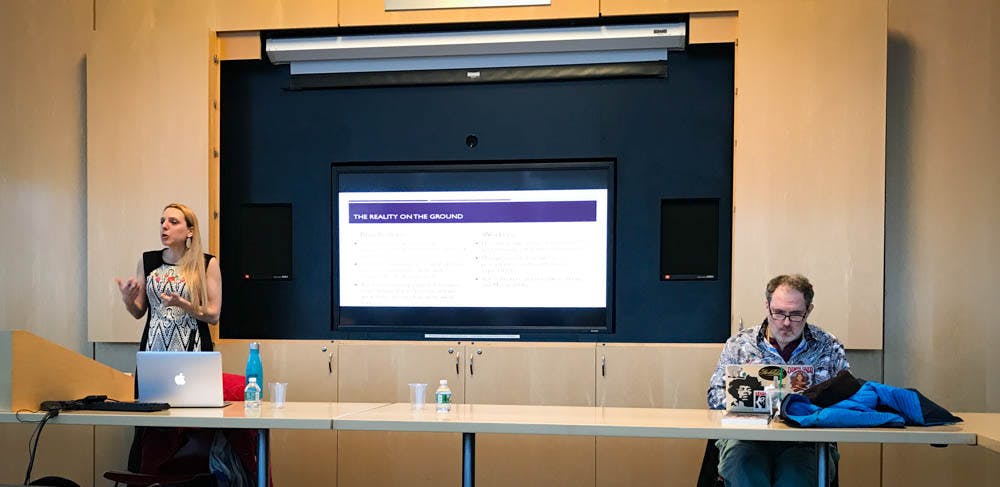Erin Beck PhD ’12, associate professor of political science at the University of Oregon, began her dissertation on the role of nongovernmental organizations with a simple question in mind: NGOs may come into “developing” nations intending to bring about constructive change, but are they actually effective in doing so?
Beck spent seven years tackling the question between 2007 and 2014, eventually publishing her results in the book “How Development Projects Persist: Everyday Negotiations with Guatemalan NGOs.” In a lecture delivered March 7, she spoke about what she learned in Guatemala and the difficulties and misconceptions that plague many intervention missions.
Her research focused on two firms specifically: Namaste, which worked to empower women entrepreneurs through loans, classes and the strengthening of traditionally “Western business values”; and Fraternity, which took a ground-up, grassroots approach to change centered on self-improvement. Though these two organizations took different approaches, the bulk of her lecture focused on the history of Namaste as well as its effect on Guatemalan women.
Beck described her work as an in-depth longitudinal analysis that involved interviews with members of Namaste and its beneficiaries and surveys of the women involved, among other sources of information. “I basically took on the role of an anthropologist,” she said.
Her extensive research did not answer the question of which NGO was more effective. “I hate that question,” she said. This line of inquiry is the wrong one to take, she said; instead, researchers should bear in mind the processes that take place as NGOs intervene in these countries.
However, her research sheds light on the impact of NGOs and the potentially problematic ways they communicate with citizens of a developing country. Namaste views Guatemalan women as “undercapitalized entrepreneurs” who need only a boost to make their respective businesses take off. This way of thinking makes sense, but is ultimately flawed, she said. The founders of Namaste are successful entrepreneurs who assume that Guatemalan women want the same things Western business people want, such as more money and business growth. They rely on their own experiences to influence how to structure their NGO intervention processes, she said. However, some of the women with whom Namaste worked were not interested in growing their businesses whatsoever, she said.
Both NGOs and beneficiaries tend to maintain a much more complex view of themselves than of the other, leading them to make many assumptions, Beck said. For instance, beneficiaries often view NGOs only as sources of loans and assistance and understand that their intervention might not have an impact in the long run.
This mismatch in expectations accounts for the low impact of NGOs, whose approaches to financial assistance are often ineffective. Though studies may show a slight increase in the average income for these women, this could mean that some are facing growth while others are facing substantial losses — not that Namaste has truly tapped what it would consider to be their entrepreneurial potential.
Despite this, NGOs such as Namaste do not leave; in fact, they often view their shortcomings as a success, or at least as the potential for future success, Beck said. In addition, the fact that women interact with the NGOs in the first place signals demand to NGO leadership, meaning that changes often go no further than paperwork, she said.
This difficulty is only compounded by the fact that the founders of these NGOs often do not want to accept that the venture in which they have invested so much money and time is not working, leading them to assume the opposite.
Beck does not attempt to give a definitive answer as to how NGOs can change for the better, since her research did not focus on this question. No grand statements should be taken away from her research, she said. However, she does shed light on some of the more problematic aspects of NGO intervention.
“It was a really interesting and engaging look at how, due to the structure and management of a lot of NGOs, well-intentioned programs are often pretty ineffectual,” said Wylie De Groff ’21. “I think it’s really important for NGOs from ‘developed’ countries to be self-critical … (and) help people in places like Guatemala on their own terms rather than trying to replicate industrial Western economies across the world.”





